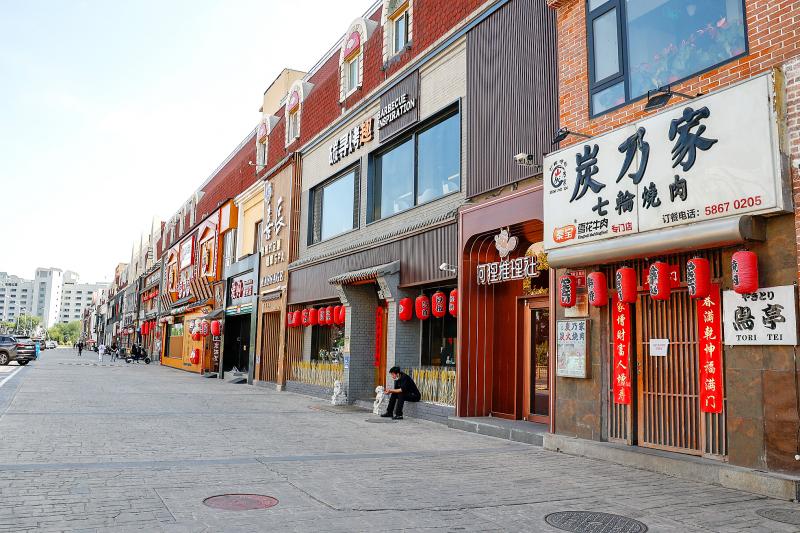China’s economic activity cooled sharply last month as widening COVID-19 lockdowns took a heavy toll on consumption, industrial production and employment, adding to fears that the economy could shrink in the second quarter.
Full or partial lockdowns were imposed in dozens of cities in March and last month, including a protracted shutdown in commercial center Shanghai, keeping workers and shoppers confined to their homes and severely disrupting supply chains.
Retail sales last month shrank 11.1 percent from a year earlier, the biggest contraction since March 2020, data from the Chinese National Bureau of Statistics showed yesterday, and worse than forecast.

Photo: EPA-EFE
Dining out services were suspended in some provinces, which led to a 22.7 percent drop in catering revenue last month, while China’s auto sales plunged 47.6 percent from a year earlier as automakers slashed production amid empty showrooms and parts shortages.
As the disease prevention measures snarled supply chains and paralyzed distribution, industrial production fell 2.9 percent from a year earlier, below expectations of 0.4 percent growth. The reading was the largest decline since February 2020.
In line with the decline in industrial output, China last month processed 11 percent less crude oil than a year earlier, with daily throughput falling to the lowest since March. The country’s power generation last month fell 4.3 percent from the previous year, the lowest since May 2020.
The shock also weighed on the job market, which Chinese leaders have prioritized for economic and social stability. The nationwide survey-based jobless rate rose to 6.1 percent from 5.8 percent in March, the highest since February 2020 when it stood at 6.2 percent.
The government aims to keep the jobless rate below 5.5 percent this year.
Fixed asset investment, a main driver that Beijing is counting on to prop up the economy as exports lost momentum, increased 6.8 percent year-on-year in the first four months, less than an expected 7 percent rise.
The extended lockdown in Shanghai and prolonged testing in Beijing are adding to the concerns about economic growth for the rest of the year, Hwabao Trust Co (華寶信託) economist Nie Wen (聶文) said in Shanghai.
“It’s still possible to achieve a GDP growth of around 5 percent this year if COVID curbs are only going to affect the economy in April and May, but the virus is so infectious, and I remain concerned about growth going forward,” Nie said.
China’s financial authorities on Sunday said that they would allow banks to cut the lower limit of interest rates on home loans based on the corresponding tenor of the loan prime rate for first home purchases, a move to support housing demand and promote healthy development of the country’s property market.
ING Groep NV analysts are looking for a 1 percent contraction in economic growth in the second quarter from a year earlier, while Nomura Holdings Inc said the Chinese economy has been facing a increasing recession risk since mid-March.
Capital Economics Ltd is now forecasting full-year Chinese growth of just 2 percent, and said if COVID-19 cannot be controlled even that is not guaranteed.
China’s central bank yesterday rolled over maturing medium-term policy loans while keeping the interest rate unchanged for a fourth straight month.
Nie said authorities would be cautious in rolling out quantitative measures such as large-scale cuts to interest rates or banks’ reserve requirement ratios to spur the economy, given concerns about US interest rate hikes and a depreciating Chinese currency, but structural and targeted measures, such as in the property sector, would be preferred.

Among the rows of vibrators, rubber torsos and leather harnesses at a Chinese sex toys exhibition in Shanghai this weekend, the beginnings of an artificial intelligence (AI)-driven shift in the industry quietly pulsed. China manufactures about 70 percent of the world’s sex toys, most of it the “hardware” on display at the fair — whether that be technicolor tentacled dildos or hyper-realistic personalized silicone dolls. Yet smart toys have been rising in popularity for some time. Many major European and US brands already offer tech-enhanced products that can enable long-distance love, monitor well-being and even bring people one step closer to

Malaysia’s leader yesterday announced plans to build a massive semiconductor design park, aiming to boost the Southeast Asian nation’s role in the global chip industry. A prominent player in the semiconductor industry for decades, Malaysia accounts for an estimated 13 percent of global back-end manufacturing, according to German tech giant Bosch. Now it wants to go beyond production and emerge as a chip design powerhouse too, Malaysian Prime Minister Anwar Ibrahim said. “I am pleased to announce the largest IC (integrated circuit) Design Park in Southeast Asia, that will house world-class anchor tenants and collaborate with global companies such as Arm [Holdings PLC],”

Sales in the retail, and food and beverage sectors last month continued to rise, increasing 0.7 percent and 13.6 percent respectively from a year earlier, setting record highs for the month of March, the Ministry of Economic Affairs said yesterday. Sales in the wholesale sector also grew last month by 4.6 annually, mainly due to the business opportunities for emerging applications related to artificial intelligence (AI) and high-performance computing technologies, the ministry said in a report. The ministry forecast that retail, and food and beverage sales this month would retain their growth momentum as the former would benefit from Tomb Sweeping Day

Thousands of parents in Singapore are furious after a Cordlife Group Ltd (康盛人生集團), a major operator of cord blood banks in Asia, irreparably damaged their children’s samples through improper handling, with some now pursuing legal action. The ongoing case, one of the worst to hit the largely untested industry, has renewed concerns over companies marketing themselves to anxious parents with mostly unproven assurances. This has implications across the region, given Cordlife’s operations in Hong Kong, Macau, Indonesia, the Philippines and India. The parents paid for years to have their infants’ cord blood stored, with the understanding that the stem cells they contained